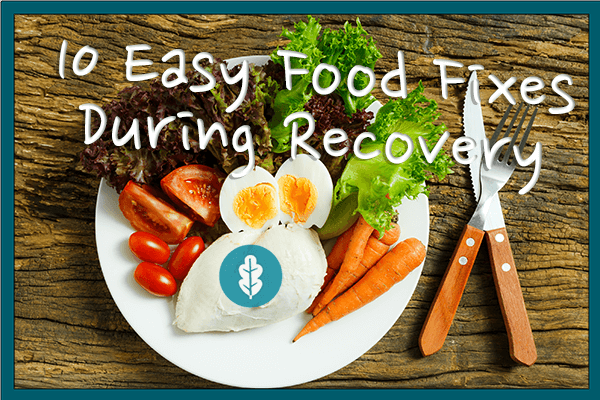10 Easy Food Fixes To Improve Your Health & Wellness in Recovery
What you put “in your face” can have a huge impact on your life in recovery – from your energy level to your physical health to how well you sleep at night. If you feel like you could probably make some healthier eating choices but aren’t sure how to make it happen, we’re here to help.

The good news is that feeling better and eating more healthfully does not require a huge diet overhaul nor does it mean that you have to cut out entire food groups or starve yourself. You can make a significant impact on how you sleep, how well you fight off illness, and how you feel every day just by making a few simple changes.
Here are 10 to get you started:
1. Drink more water. Staying hydrated can give your energy levels a boost and help you fend off illness, process and metabolize the vitamins and nutrients in food, and get better more quickly if you have a bacterial or viral infection or illness. You can work this into your routine by starting your day with a big glass of ice water and drinking it before you do anything else, carrying a water bottle with you throughout the day, and/or making it a habit to drink herbal tea at night. Not a fan of water? Sub in carbonated water, herbal tea, or add lemon, cucumber, or mint to change up the flavor.
2. Shop the perimeter of the grocery store. In the aisles, you will find processed foods loaded with trans fat, sugar, non-nutritive calories, and unnecessary soy, preservatives, and fillers. Around the outside of the store you will find produce, meats, and dairy – the building blocks for what you should be eating every day. Spend most of your time here and try to avoid foods that come in cans and boxes.
3. Bring healthy snacks with you. It is easy to grab fast food when you are on the run or short on time, so carry a package of nuts or a sandwich with you, so you can stave off hunger healthfully in a pinch.
4. Cover half your plate with fruits or vegetables. Portion control is always an issue with healthy eating – not enough veggies and fruits, and too much of everything else. Start your meals by filling up half your plate with leafy greens or brightly colored produce, leaving a corner for protein and a corner for whole grains.
5. Throw a cup of veggies into your meal. Not getting enough vegetables in your diet? Most people aren’t. You can fix this by throwing a cup of frozen or fresh veggies into eggs, casseroles, or even a can of soup to help you get more nutrients.
6. Skip the fried stuff. As tasty as fried foods are, they are high in trans fats and heart-clogging calories. Try the fresh versions of the breaded/baked versions of your favorites instead.
7. Notice the added sugar. Jarred tomato sauce, bottled sauces, and crackers – added sugar is in almost every processed food item. This can kill your energy and your healthy eating goals.
8. Eat good fats. Unsaturated fats like the kind you find in avocados or olive oil are great for you. Eat them in moderation to round out your diet, lube up your joints, and keep your skin glowing.
9. Eat mindfully. Whether you tend to eat too much or too little, or often eat unhealthy foods, eating mindfully can help you to make better choices. This means planning your meals in advance if possible, preparing yourself a plate of food, and sitting down (not standing) to do nothing but eat. Turn your attention to your food – how it tastes, how you feel, if you are full or not, what you are craving – and keep returning your attention to your food if your mind wanders. The more present you are, the more likely you are to stop when you are full and eat foods that will fill you with the vitamins you need to stay strong.
10. Notice if you are having a hard time sustaining your healthy food changes. It is not easy to develop new habits, especially around food. How and what we eat is very often attached to memory and mood, and it can be difficult to suddenly start doing things differently. If you’re having trouble, talk to a therapist about what is getting in your way.